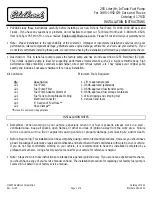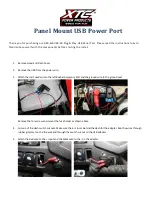
TECHNICAL SPECIFICATIONS
443
B
IODIESEL
F
UEL
R
EQUIREMENTS
Pickup Models
Your vehicle has been validated and approved for the use
of biodiesel in blends up to 20% (B20) provided that you
comply with the requirements outlined below. It is
important that you understand and comply with these
requirements. Failure to comply with Oil Change
requirements for vehicles operating on biodiesel blends
up to B20 will result in premature engine wear. Such wear
is not covered by the New Vehicle Limited Warranty.
Biodiesel is a fuel produced from renewable resources
typically derived from animal fat, rapeseed oil (Rapeseed
Methyl Ester (RME) base), or soybean oil (Soy Methyl Ester
(SME or SOME) base). Biodiesel fuel has inherent
limitations which require that you understand and adhere
to the following requirements if you use blends of
biodiesel greater then 5% but not greater than 20%
(B6-B20). There are no unique restrictions for the use of
B5. Use of blends greater than 20% is not approved. Use
of blends greater than 20% can result in engine damage.
Such damage is not covered by the New Vehicle Limited
Warranty.
Fuel Quality — Must Comply With ASTM Standards
The quality of biodiesel fuel may vary widely. Only fuel
produced by a BQ9000 supplier to the following
specifications may be blended to meet biodiesel blend
(B6–B20) fuel meeting ASTM specification D-7467:
Petrodiesel fuel meeting ASTM specification D-975
and biodiesel fuel (B100) meeting ASTM specification
D-6751.
Fuel Oxidation Stability — Must Use Fuel
Within Six Months Of Manufacture
Biodiesel fuel has poor oxidation stability which can result
in long term storage problems. Fuel produced to approved
ASTM standards, if stored properly, provides for protection
against fuel oxidation for up to six months.
Fuel Water Separation — Must Use
Mopar®/Cummins® Approved Fuel Filter
Elements
You must use Mopar®/Cummins® approved fuel filter
elements in both your engine mounted filter and frame
mounted filter.
Biodiesel fuel has a natural affinity to water and water
accelerates microbial growth. Your Mopar®/Cummins®
filtration system is designed to provide adequate fuel
water separation capabilities.
Biodiesel Fuel Properties — Low Ambient
Temperatures
Biodiesel fuel may gel or solidify at low ambient
temperatures, which may pose problems for both storage
and operation. Precautions can be necessary at low
ambient temperatures, such as storing the fuel in a
heated building or a heated storage tank, or using cold
temperature additives.
Fuel In Oil Dilution — Must Adhere To
Required Oil Change Interval
Fuel dilution of lubricating oil has been observed with the
use of biodiesel fuel. Fuel in oil must not exceed 5%. To
ensure this limit is met your oil change interval must be
maintained to the following schedule:
Ram PickUp 2500/3500 Only — 15,000 miles
(24,000 km)*
(*unless otherwise notified with an oil service message.)
CAUTION!
Under no circumstances should oil change intervals
exceed 15,000 miles (24,000 km) if operation
occurs with greater than 5% biodiesel blends.
Oil change intervals should not exceed 6 months in
either case. Failure to comply with these Oil Change
requirements for vehicles operating on biodiesel
blends up to B20 may result in premature engine
wear. Such wear is not covered by the New Vehicle
Limited Warranty.
B20 Biodiesel capable: The engine may suffer severe
damage if operated with concentrations of biodiesel
higher than 20%.
9
23_DJD2_OM_EN_USC_t.book Page 443
















































